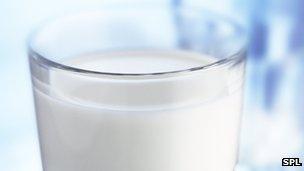Full-fat dairy intake 'affects breast cancer recovery'
- Published

Researchers found full-fat milk could increase the risk of women who already had breast cancer dying
Eating full-fat dairy products after a diagnosis of breast cancer could worsen your prognosis, say US researchers.
A 12-year study of more than 1,800 breast cancer survivors found eating one or more portions of full-fat milk, cream, cheese or yogurt a day was associated with higher mortality.
But eating low-fat dairy was not found to reduce the risk of death or the chance of the cancer returning.
Cancer Research UK said the study had "severe limitations".
Previous studies have shown that higher lifetime exposure to the hormone oestrogen is linked with breast cancer, the researchers wrote in the Journal of the National Cancer Institute, external.
Some other studies have linked dairy intake with hormone-linked cancers such as prostate and ovarian cancer.
The latest study pointed out this could be because high-fat dairy products contained more oestrogen than the skimmed or low-fat versions.
The researchers analysed data from a cohort of women who had been diagnosed with early-stage invasive breast cancer about two years before.
They all filled in a questionnaire about their diet over the past year and 1,500 women also did a follow-up survey six years later.
This included details about consumption of cream, milk, condensed or evaporated milk, ice cream and custard, cheeses and yogurts.
Overall, 349 women had recurrence of the disease and 372 died - half from causes other than breast cancer.
There was no association with overall dairy intake and mortality but when researchers looked at those consuming high-fat or low-fat products they found significant differences.
Healthy diet
The researchers said women consuming one or more servings per day of high-fat dairy had a 64% higher risk of dying from any cause and a 49% increased risk of dying from their breast cancer during the follow-up period.
However, the opposite effect was not seen in those eating low-fat dairy foods.
On the whole, the women ate more low-fat dairy than high-fat, which the researchers said followed general nutritional guidance.
Co-author Dr Bette Caan said: "High-fat dairy is generally not recommended as part of a healthy diet.
"Switching to low-fat dairy is an easy thing to modify."
But Martin Ledwick, Cancer Research UK's head information nurse, said there were "severe limitations" to the study.
"It relies on people being able to remember what they have eaten over the year and, as the authors say, their findings confirm previous studies that find no link between dairy intake and breast cancer survival."
Sally Greenbrook, senior policy officer at Breakthrough Breast Cancer, said: "This study specifically looks at women who have already been diagnosed with breast cancer and how low or high-fat dairy products may affect them.
"Any women who have had breast cancer and are concerned about their diet should discuss this with their doctors."
She added that all women were advised to follow a healthy diet for a number of health reasons including keeping a healthy weight which in itself, along with sensible alcohol intake and regular exercise, could help to reduce breast cancer risk.
- Published7 December 2011